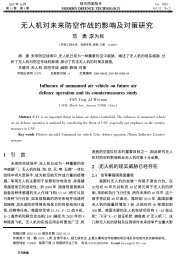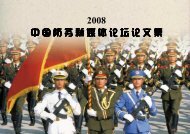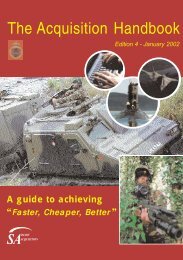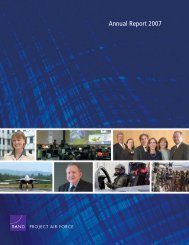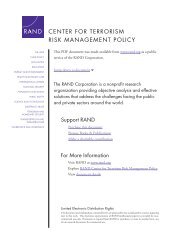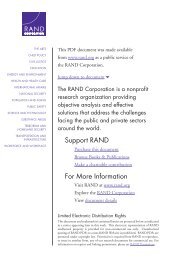How Terrorist Groups End - RAND Corporation
How Terrorist Groups End - RAND Corporation
How Terrorist Groups End - RAND Corporation
Create successful ePaper yourself
Turn your PDF publications into a flip-book with our unique Google optimized e-Paper software.
Policing and Japan’s Aum Shinrikyo 61<br />
intelligence (such as monitoring phone calls) and human intelligence<br />
(such as using informants to penetrate terrorist cells). Human intelligence<br />
can provide some of the most useful actionable intelligence.<br />
But it requires painstaking work and patience in recruiting informants<br />
who are already in terrorist organizations or placing informants in terrorist<br />
organizations. Intelligence collection and analysis can also be<br />
reinforced by countering the ideology and messages of terrorist groups<br />
through what is often referred to as information operations: the use of a<br />
variety of strategies and tools to counter, influence, or disrupt the message<br />
and operation of terrorist groups. 51<br />
Second is the arrest of key leaders and their support network. In<br />
democratic countries, this involves capturing key members and presenting<br />
the evidence in court. Terrorism involves the commission of<br />
violent crimes, such as murder and assault. Consequently, the investigation,<br />
trial, and punishment of perpetrators should be a matter for<br />
the wider criminal-justice system—including the police. 52 The barriers<br />
can be significant. Finding sufficient evidence that can be presented<br />
in court but that does not reveal sensitive information about sources<br />
and methods can be challenging. This is especially true if a terrorist<br />
has not yet perpetrated an attack. In many cases, it may be easier and<br />
more effective to arrest and punish terrorists for other offenses, such<br />
as drug trafficking, that may be ancillary to their terrorist activity. In<br />
nondemocratic societies, the policing approach is often drastically different,<br />
because laws and norms of behavior may be different. 53<br />
The third step is the development and passage of antiterrorism<br />
legislation. This can involve criminalizing activities that are necessary<br />
for terrorist groups to function, such as raising money or recruiting<br />
members. It can also involve passing laws that make it easier for intelli-<br />
51 On the use of information operations in a military context, see, for example, U.S. Joint<br />
Chiefs of Staff, Information Operations, Washington, D.C., February 13, 2006.<br />
52 See, for example, Clutterbuck (2004, pp. 142–144).<br />
53 On the dilemmas of U.S. assistance to police in nondemocratic countries, see Seth G.<br />
Jones, Olga Oliker, Peter Chalk, C. Christine Fair, Rollie Lal, and James Dobbins, Securing<br />
Tyrants or Fostering Reform? U.S. Internal Security Assistance to Repressive and Transitioning<br />
Regimes, Santa Monica, Calif.: <strong>RAND</strong> <strong>Corporation</strong>, MG-550-OSI, 2006.




